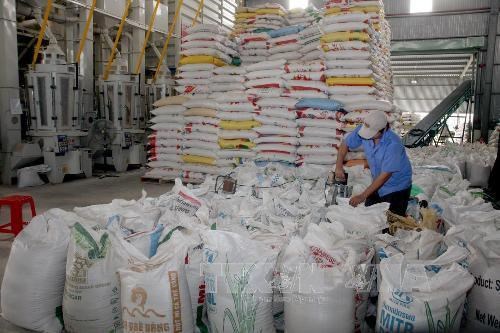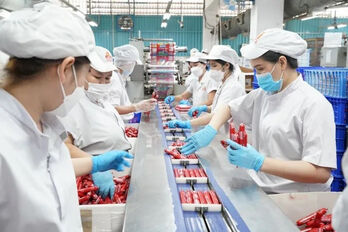
Illustrative photo. (Source: VNA)
The country exported 1.1 million tonnes of rice for 606 million USD in the first quarter of the year, down 30.4 percent and 17.4 percent, respectively, against the same period last year, according to the Ministry of Agriculture and Rural Development.
The two largest buyers of Vietnamese rice in the reviewed period remained China and the Philippines.
Despite the fall in volume, rice export prices jumped from January to March on account of high demand for food reserves around the world, said Tran Quoc Toan, Deputy Director of the Ministry of Industry and Trade (MoIT)’s Agency of Foreign Trade.
By the end of March, Vietnam’s rice price remained at a high of 547 USD per tonne, up 18.6 percent, or 86 USD, compared to a year earlier.
Rice exporters have been increasingly focusing on improving quality and traceability to meet the strict standards of markets such as the EU, the Republic of Korea (RoK), and the US, Toan said.
Vietnam has entered into various FTAs with strategic countries and regions, such as the Comprehensive and Progressive Agreement for Trans-Pacific Partnership (CPTPP), the EU-Vietnam Free Trade Agreement (EVFTA), and, more recently, the Regional Comprehensive Economic Partnership (RCEP) and the UK-Vietnam Free Trade Agreement (UKVFTA).
He said that in order to utilise FTAs and boost the global market share of Vietnamese rice at more competitive prices, the ministry will continue to coordinate with ministries, branches, and the Vietnam Food Association to help businesses effectively implement deals and make the most of markets such as the RoK and the EU.
The MoIT will adopt mechanisms and policies to remove technical and trade barriers, internalise international commitments, customs procedures, logistics, and credit, and focus on branding to create a foundation for rice exporters to exploit foreign markets, Toan said.
He also urged rice exporters and farmers to be more active in improving product competitiveness in terms of quality and price as well as building and protecting Vietnamese trademarks, so as to diversify markets and promote sustainable exports./.
VNA
 Vietnam on track to rank among world’s 30 largest economies
Vietnam on track to rank among world’s 30 largest economies



